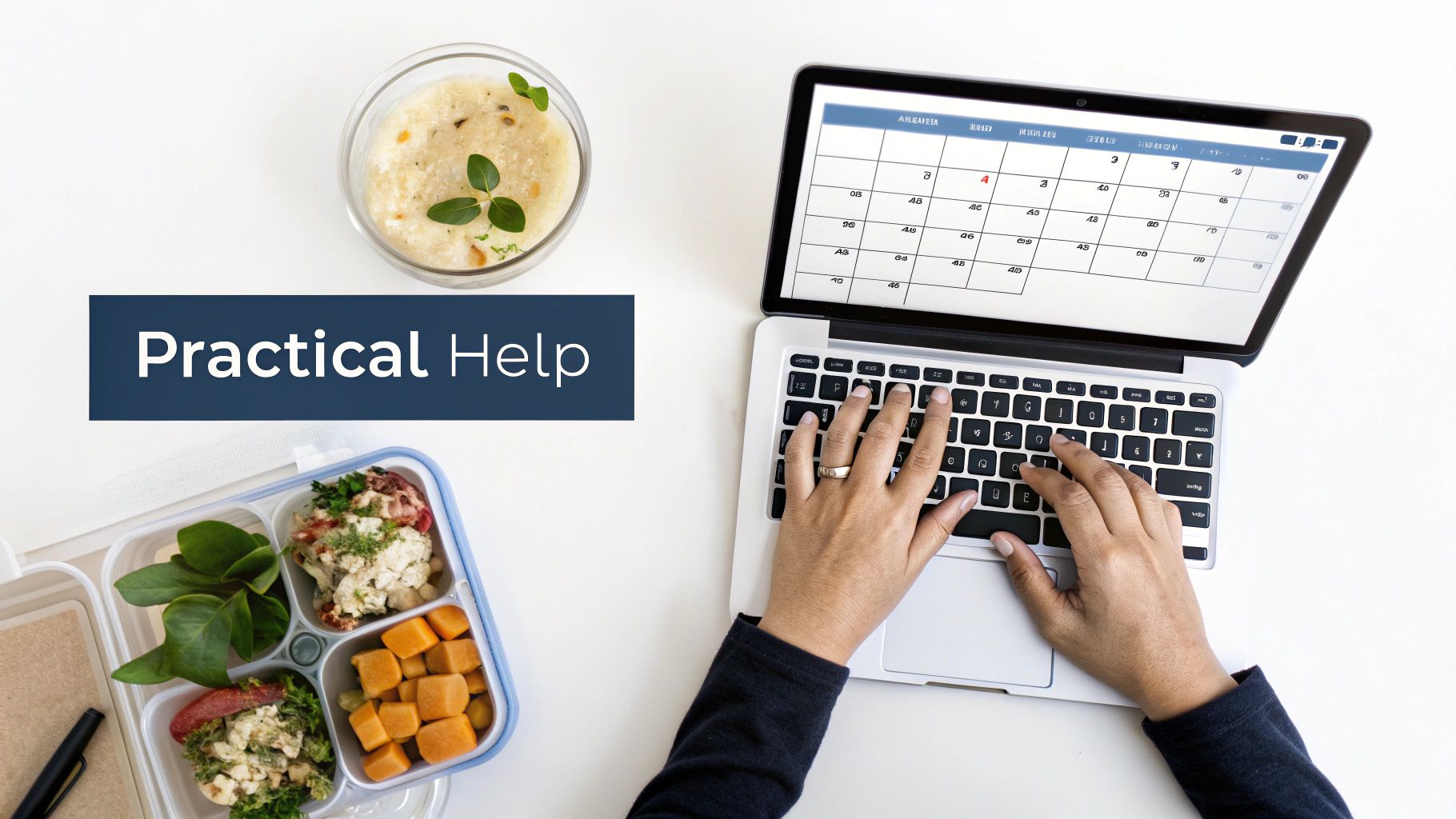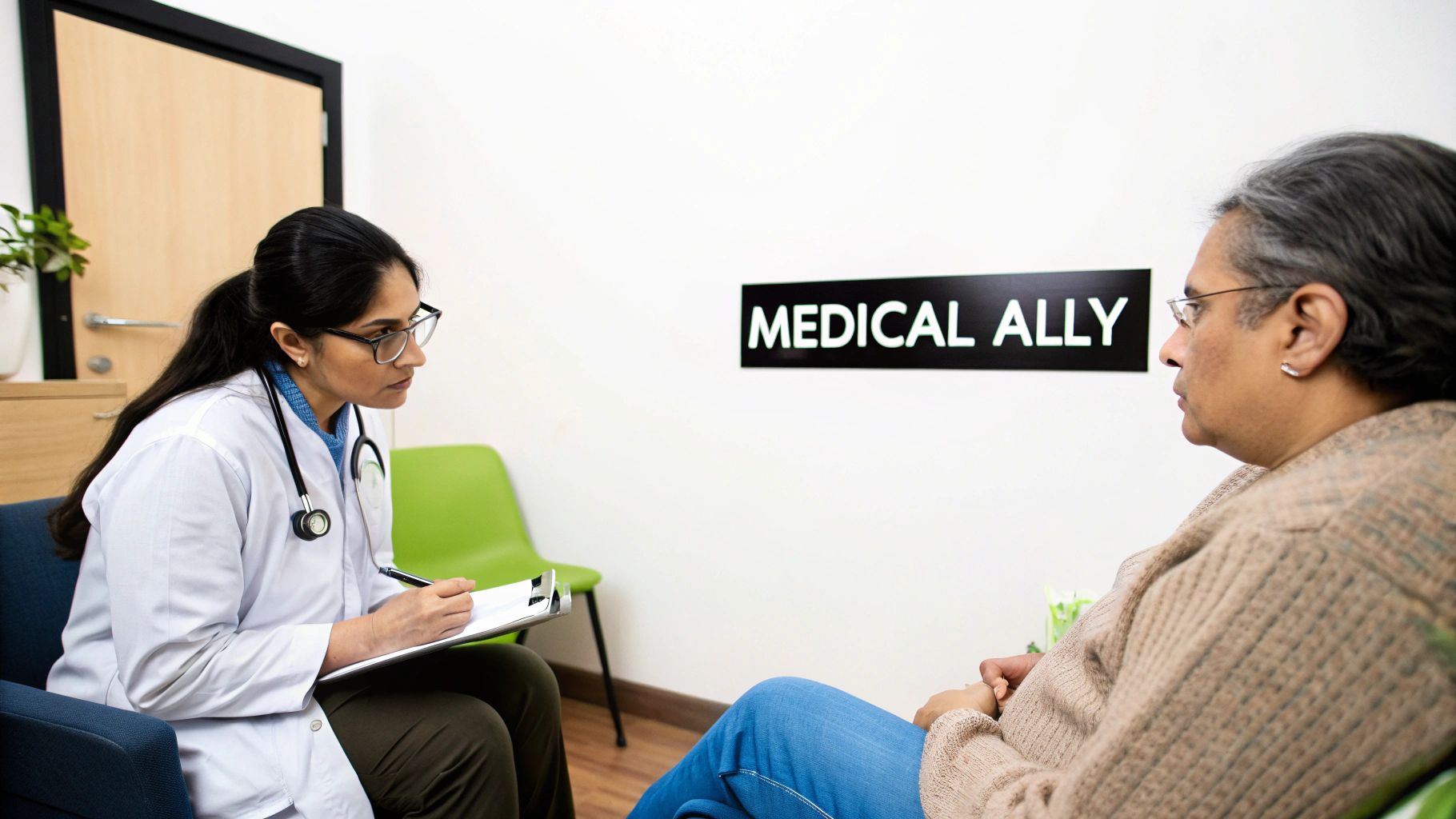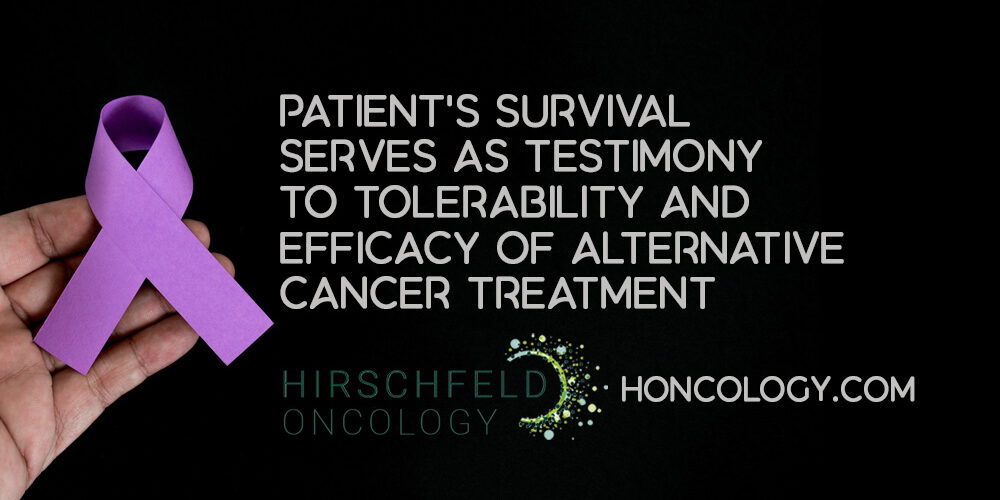When someone you love gets a cancer diagnosis, the world just seems to stop. The absolute best way to support someone with cancer is by being specific and practical—and by becoming an active, empathetic listener. It’s about moving beyond the all-too-common "let me know if you need anything" and instead offering genuine, proactive help that can make a monumental difference in their day-to-day life.
What to Do When Someone You Love Has Cancer

Hearing a friend or family member say, "I have cancer," can leave you feeling completely powerless. Your first instinct is to help, but it’s tough to know what’s actually useful versus what might unintentionally add to their stress.
The key is to shift from passive offers to active, thoughtful support. This means replacing those well-intentioned but vague gestures with concrete actions. Instead of waiting to be asked, you become the person who anticipates their needs, listens without judgment, and helps maintain a sense of normalcy in a life that's been turned upside down. Your role isn't to fix anything, but simply to walk alongside them, making the path feel a little less lonely.
Start with Sensitive Communication
From the very first conversation, your words carry a lot of weight. The goal is to create a safe space where they feel truly seen and heard, not like they have to manage your emotions on top of their own. Sometimes, the most powerful thing you can do is just listen. Let them lead.
It's completely natural to feel awkward or worry about saying the wrong thing. In fact, admitting that can be a great way to connect. A simple, "I don't really know what to say, but I'm so sorry you're going through this, and I'm here for you," is so much more authentic than offering unsolicited advice or clichés about being strong.
This isn’t just a medical journey; it’s a deeply personal one. The weight of this reality is underscored by just how many people are affected. In 2022 alone, there were an estimated 20 million new cancer cases worldwide, and projections show that around 1 in 5 people will develop cancer in their lifetime. This context just reinforces the profound need for compassionate, effective support from friends and family. You can read the full WHO report on the global cancer burden for more insight.
What to Say vs What to Avoid
Navigating these initial conversations requires a delicate balance of empathy and practicality. This table offers specific communication examples to help supporters navigate initial conversations with sensitivity and effectiveness, providing helpful phrases and highlighting common pitfalls to steer clear of.
These examples highlight a core principle: offer concrete help and emotional validation, not empty platitudes or unsolicited solutions.
The most meaningful support often comes from just being present. Your consistent, quiet presence can be a greater comfort than any perfectly crafted sentence. It says, "You are not alone in this," without needing any words at all.
Providing Practical Day-to-Day Support

When someone you care about has cancer, emotional support is crucial. But sometimes, the most meaningful thing you can do is help with the small, practical burdens of everyday life. The fatigue from treatment, the constant appointments, the sheer emotional weight of it all—it can make routine tasks feel impossible.
This is where you can make a real difference. The trick is to shift from the vague, "Let me know if you need anything," to offering specific, tangible help. Asking a broad question actually puts the burden back on them to come up with a task list. When you offer something concrete, it’s much easier for them to simply say yes.
Make Specific Offers of Help
Think about the daily grind. What takes up time and energy? Cooking, cleaning, errands, childcare. Frame your offers around these things. It shows you’ve really considered what they’re going through.
Instead of a generic offer, try getting specific about the task and the timing. For instance, "I'm heading to the grocery store on Wednesday afternoon, can I grab your weekly essentials while I'm there?" Or, "I have some free time Tuesday morning. Would it help if I came by to walk the dog or just do a load of laundry?"
These kinds of offers are a gift. They remove the mental gymnastics of having to ask and delegate, and they show you’re genuinely ready to pitch in.
Here are a few areas where a helping hand is almost always a relief:
- Meal Support: Cooking is often the first thing to go. Offer to drop off a home-cooked meal that can be easily frozen, or get a few friends together to start a meal train.
- Household Chores: Never underestimate the power of a clean kitchen or a mown lawn. Simple things like taking out the trash or tidying up can make a world of difference to their peace of mind.
- Child and Pet Care: Juggling kids or pets during treatment is incredibly stressful. Offer to handle a school pickup or take the dog for a long walk to give them a real break.
- Running Errands: Picking up prescriptions, swinging by the post office, or handling a grocery run can save them precious energy.
A study of cancer patients found that nearly 50% are afraid to tell their employers about their diagnosis, often because they fear being seen as a burden. This hesitation can easily spill over into their relationships with friends and family. That’s why offering specific, no-strings-attached help is so powerful—it bypasses their need to ask.
Organize a Coordinated Support System
When a whole community of friends and family wants to pitch in, a little organization goes a long way. Coordinating everyone's efforts prevents the person with cancer from being overwhelmed with calls and texts, and it ensures that help is steady and reliable. This is a fantastic way for a group to support someone with cancer.
A shared digital calendar can be a game-changer, acting as a central hub for the entire support team. Using a free tool like Google Calendar, you can create a simple system that lets people sign up for tasks without having to constantly check in.
Here’s a quick way to get one started:
- Create a New Calendar: Give it a clear name, like "Support for [Name]."
- Share Access: Invite close friends and family, giving them permission to view and edit the calendar.
- Block Out Key Times: Add recurring events like treatment days, appointments, or days when they typically feel most fatigued (e.g., the two days after chemo).
- Create "Help Needed" Slots: Post open time slots for specific needs. Think: "Dinner Drop-off," "Ride to Appointment," or "Childcare Help from 3-5 PM."
This approach empowers people to help in a way that fits their own schedule and provides a clear picture of where the gaps are. By stepping up to be the organizer, you’re lifting a huge mental load, allowing the person you care about to focus on what truly matters: their health and recovery.
Being Their Ally in the Medical World

Let's be honest: navigating the healthcare system is one of the toughest parts of a cancer diagnosis. Medical appointments can feel like a blur of complicated information, heavy decisions, and a whole lot of emotion. This is where you can truly make a difference as a medical ally.
Think of yourself as an extra set of ears, a dedicated note-taker, and a calm, steady presence. Your role isn't to speak for them, but to help them find their own voice and feel confident. Just by offering to join them at key appointments or infusion sessions, you can lift a huge weight off their shoulders.
Getting Ready for Appointments
The best support often starts before you even set foot in the clinic. A few days before an appointment, try to help them prepare a list of questions. When someone is feeling anxious, it's so easy to forget what you wanted to ask the minute the doctor walks in.
You could say something simple like, "Hey, why don't we jot down everything we want to ask the oncologist on Tuesday? No question is too small." This simple act helps organize their thoughts and makes sure nothing gets missed.
Here are a few areas you can help them think through for their question list:
- About the Treatment: What are the pros and cons here? What’s the main goal of this particular treatment plan?
- Side Effects: What should we expect, and how do we manage it? Who do we call if a new symptom pops up at 2 a.m.?
- The Logistics: How long will these sessions take? What does the full schedule look like for the next few weeks or months?
- Understanding Results: Can you walk us through the latest scan or bloodwork? What do these numbers actually mean for the plan?
Walking in with a written list is incredibly empowering. It helps them lead the conversation and get the clarity they need.
Being Their Rock During the Appointment
Once you're in the room, your most important job is to listen and write things down. Doctors often share a ton of information very quickly, and it’s nearly impossible to process it all in the moment. Offer to be the note-taker so they can focus completely on the conversation.
Be sure to capture the important stuff:
- Names of new medications and exactly how to take them.
- Dates and times for the next tests, scans, or follow-ups.
- Key phrases or explanations the doctor uses.
- The right phone number for the nurse's line versus the scheduling desk.
Afterward, you can go over the notes together in a more relaxed setting. This gives them space to digest everything without the pressure of the clinic environment. You can also use these notes as a foundation for organizing the details into one place, something we help patients do with our cancer care plans.
One of the most powerful things you can do as a medical ally is simply observe. Pay attention to their body language. If they seem hesitant to ask something, a gentle prompt can help. "I think we had one more question about managing nausea, right?" That small nudge can make all the difference.
This kind of support is vital throughout the entire cancer experience. And the good news is, people are living longer and better lives after a diagnosis. The number of cancer survivors is growing, with projections showing 18.6 million survivors in the U.S. by 2025. This incredible progress, fueled by a steady drop in cancer death rates since the 1990s, means that support is needed not just for the initial treatment, but for the long haul. You can learn more about this progress in the AACR Cancer Progress Report.
Infusion Day and Appointment Checklist
Long treatment days or big appointments require a bit of planning to make them as comfortable as possible. Think of it like packing for a trip—a little preparation goes a long way. This checklist is a great starting point to make sure you have all the essentials covered.
Having these things packed and ready removes a layer of stress on treatment days, letting the person you're supporting focus their energy on what matters most: healing. By being that calm, organized, and attentive presence, you’re offering one of the most powerful forms of support there is.
Helping with Financial and Legal Burdens
A cancer diagnosis isn't just a medical crisis. It’s a life crisis that unleashes a tidal wave of logistical, financial, and legal headaches. This is an area where you can step in and make a monumental difference, lifting a heavy administrative burden so your loved one can focus on getting well.
Sorting through a mountain of bills might not feel as personal as cooking a meal, but trust me, it’s one of the most powerful ways to show you care. The stress of managing these details alone is immense. Just offering to be a second set of eyes or an organizational partner can provide more relief than you can imagine.
Navigating the Financial Maze Together
The financial side of a cancer diagnosis can be completely overwhelming. Costs add up faster than anyone expects—co-pays, prescriptions, travel to and from appointments, not to mention lost wages. Your role isn't to become a financial wizard overnight, but to help them find and organize the information they need to regain a sense of control.
You can start with a very specific, low-pressure offer. Try something like, "Would it be helpful if I came over this weekend and we spent an hour just sorting these medical bills into a simple spreadsheet?" This breaks a scary, amorphous task into a single, manageable step.
Here are a few concrete ways you can assist:
- Become an Insurance Detective: Offer to sit down and read through their insurance policy with them. The goal is to get a clear picture of what’s covered, what the deductible is, and what out-of-pocket maximums they're looking at.
- Organize the Paper Trail: Create a simple filing system—a binder with dividers or a folder on a laptop—to keep track of every bill, insurance explanation of benefits (EOB), and receipt. This makes it so much easier to spot errors and stay on top of payments.
- Research Financial Lifelines: Dozens of non-profit organizations offer grants or financial aid for everything from treatment costs to utility bills. You can be the one to research these programs and help with the applications.
The economic strain of cancer is a huge, often unspoken, part of the journey. In the U.S. alone, the financial burden on patients was recently estimated at a staggering $21.1 billion, with $16.2 billion of that being direct out-of-pocket costs. These numbers show exactly why your practical help is so vital. You can discover more insights from the American Cancer Society about the true cost of care.
Gently Approaching Legal Planning
Let's be honest, conversations about legal documents are heavy. They can feel awkward and uncomfortable, but getting these things in order provides an incredible amount of peace of mind. Documents like a living will or a durable power of attorney for healthcare are all about ensuring a person's wishes are honored if they ever can't speak for themselves.
The key here is sensitivity. You have to let them lead. You might open the door to the conversation gently, with something like: "I know you have a million things on your plate, but I was thinking about how we can make sure you're always in the driver's seat. Have you ever thought about things like a healthcare directive? If you're open to it, I'm happy to help you find some good resources."
Your goal is not to pressure them but to empower them. By offering to help with the research or paperwork, you're making it clear that this is about respecting their autonomy and ensuring their voice is heard, no matter what.
It’s crucial to frame this as a practical step for anyone dealing with a serious illness, not as a sign that you've lost hope. This is about being prepared, not about prognosis. Offering to help them find a qualified elder law or estate planning attorney is a tangible, valuable way to support them.
Your help in these non-medical areas is a true lifeline. By helping untangle the frustrating knots of financial and legal paperwork, you're giving them the priceless gifts of time, energy, and clarity—all of which they need for their healing. It's a profound act of care that supports the whole person, not just the patient.
Why Caregiver Self-Care Is Not Selfish

When you're pouring all your energy into supporting someone with cancer, it's so easy to feel like your own needs don't just come last—they don't even make the list. But I've seen it time and again: putting your well-being on the back burner simply isn't sustainable.
Supporting a loved one through cancer is a marathon, not a sprint. Trying to go full-speed without rest will only lead to exhaustion. Self-care isn't a luxury or a selfish act; it's a fundamental requirement for showing up as the effective, compassionate supporter your loved one needs for the long haul. You just can't pour from an empty cup.
Recognizing Caregiver Burnout and Compassion Fatigue
Have you heard of caregiver burnout? It's that deep-down state of physical, emotional, and mental exhaustion that creeps in when you feel completely overwhelmed by the constant demands. It often builds so slowly that you might not even spot it until you're running on fumes.
Then there's compassion fatigue. It's a bit different. Think of it as the emotional toll that comes from being so close to someone's trauma and suffering. It can leave you feeling numb or detached, wearing away at the very empathy that makes you such a great caregiver in the first place.
Keep an eye out for these signs in yourself:
- Feeling tired all the time, even after a full night's sleep.
- Getting easily irritated or impatient, maybe even with the person you’re caring for.
- A sense of hopelessness, like you're trapped.
- Pulling back from friends or hobbies you used to love.
- Changes in your appetite or sleep—either way more or way less than usual.
Just acknowledging these feelings is a huge first step. Pushing them down will only drain your ability to care for anyone, including yourself.
Practical Strategies for Protecting Your Well-Being
Taking care of yourself has to be an intentional act. It’s about building small, restorative moments into your daily routine, setting firm but kind boundaries, and learning to accept help when it's offered. We’re not talking about grand, expensive gestures; this is about consistent, small acts of self-preservation.
Start by figuring out what actually recharges your batteries. Is it a quiet walk in the park? Losing yourself in a good playlist? A long phone call with a friend? Whatever it is, schedule it. Put it in your calendar like you would a doctor's appointment. Even just 15-20 minutes a day can make an incredible difference.
"Caregiving is a journey of both deep love and significant challenge. The most compassionate thing you can do for the person you're supporting is to also be compassionate with yourself. Your strength depends on your own well-being."
Delegating is also a game-changer. You don't have to be the hero who does it all. Make a simple list of tasks others could handle—things like grabbing groceries, running errands, or just sitting with your loved one for an hour so you can step outside. People genuinely want to help but often don't know how. Giving them a specific, concrete task is a gift to everyone involved.
Finding Your Own Support System
You can't be the only one providing support. Just like your loved one needs a team, so do you. Building your own support network is crucial for navigating the intense emotions of caregiving. This is especially true when things get really tough, like when you're supporting families of stage 4 cancer patients.
Look into connecting with a therapist or joining a local or online caregiver support group. These are safe spaces where you can share what you’re going through with people who truly understand. There's something incredibly validating about talking to someone who just gets it, which can make you feel so much less isolated.
Remember, taking care of yourself isn't taking away from your loved one. It's what allows you to continue being the steady, reliable rock they need.
Common Questions About Cancer Support
When someone you care about is diagnosed with cancer, it feels like the world stops. Suddenly, a thousand questions are racing through your mind. You want to help, but you're scared of saying or doing the wrong thing. You want to be a source of comfort, not another source of stress.
First, take a breath. Feeling uncertain is completely normal. The most important thing to remember is that you don't need to have all the right answers. Just showing up—consistently and with compassion—is often the most powerful gift you can give.
Here are some of the most common and difficult questions that come up for friends and family, along with some practical advice from years of experience.
How Do I Talk About the Future Without Being Insensitive?
It’s tempting to jump into cheerleader mode and make grand promises about the future, but this can sometimes feel dismissive of the fear and uncertainty the person is facing right now. The best approach is often to focus on the near future and things you can genuinely look forward to together.
Instead of saying, "Don't worry, you'll beat this and we'll go on that big trip next year," try grounding the conversation in the present. Something as simple as, "I'm really looking forward to our movie night on Friday," or "I can't wait to see those daffodils we planted come up this spring" can mean the world. It creates shared, positive moments without glossing over their reality. Let them be the one to bring up long-term plans, and if they do, just listen and follow their lead.
Your job isn't to erase their fear with forced positivity. It's to be a companion who brings moments of normalcy and connection into the here and now. Real hope is often built on small, steady moments of shared life.
What If They Push Me Away or Say They Don't Need Help?
This is incredibly common, and it’s almost never about you. A cancer diagnosis can make a person feel like they’ve lost all control over their own life and body. Saying "I'm fine" or turning down help can be a way of holding onto their independence and identity.
The key is not to take it personally or give up. Instead, shift your approach. Give them some space, but gently and consistently remind them you're there. A simple, no-pressure text like, "Thinking of you. No need to reply," lets them know you care without demanding anything in return.
Even better, make your offers specific and easy to accept. Rather than asking "What can I do?", try "I'm dropping off a lasagna for you tomorrow—I'll just leave it on the porch." This removes the burden of them having to ask for or coordinate help.
Is It Okay to Talk About My Own Problems?
Yes, absolutely—with the right timing and balance. Your relationship shouldn't become a one-way street. Sharing parts of your life helps maintain the friendship and normalcy you both value.
The trick is to read the room. If they're clearly exhausted or in pain from a recent treatment, it's probably not the time to vent about your bad day at work. When you do share, keep it light and brief. You're giving a life update to a friend, not asking them to carry your emotional load. Preserving that two-way connection is healthy, as long as their journey remains the priority.
How Can I Best Support the Primary Caregiver?
Stepping up for the primary caregiver is one of the single most helpful things you can do. They are the unsung heroes of this journey, often carrying an immense physical and emotional weight that goes completely unseen.
- Offer a Real Break: Don't just say, "Let me know if you need a break." Offer a specific time. "I'm free Saturday afternoon. Why don't I come sit with John for a few hours so you can get out of the house?"
- Feed Them: Bring over a meal and make it clear it’s for the caregiver. Ask them what their favorite comfort food is. They're often so focused on the patient's dietary needs that their own get forgotten.
- Just Listen: Create a safe space where the caregiver can talk, vent, or cry without any judgment. They need an outlet for their own fears and frustrations, too.
Sometimes, just looking them in the eye and saying, "You are doing an incredible job," is enough to give them the strength to keep going.
For more in-depth answers, you can always find more in our Hirschfeld Oncology cancer resources and frequently asked questions.
At Hirschfeld Oncology, we know that a strong, compassionate support system is a vital part of cancer care. If you or your loved one are looking for treatment options in the NYC area, our team is here to help. You can learn more about our patient-first approach on our blog at https://honcology.com/blog.





.png)


.png)
.png)




